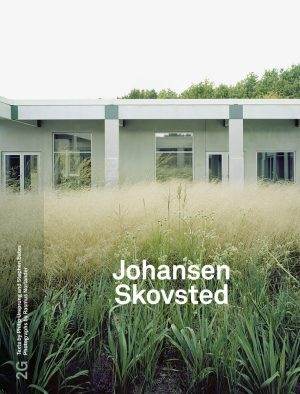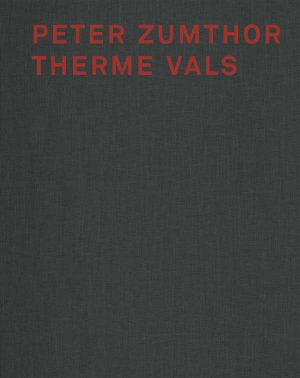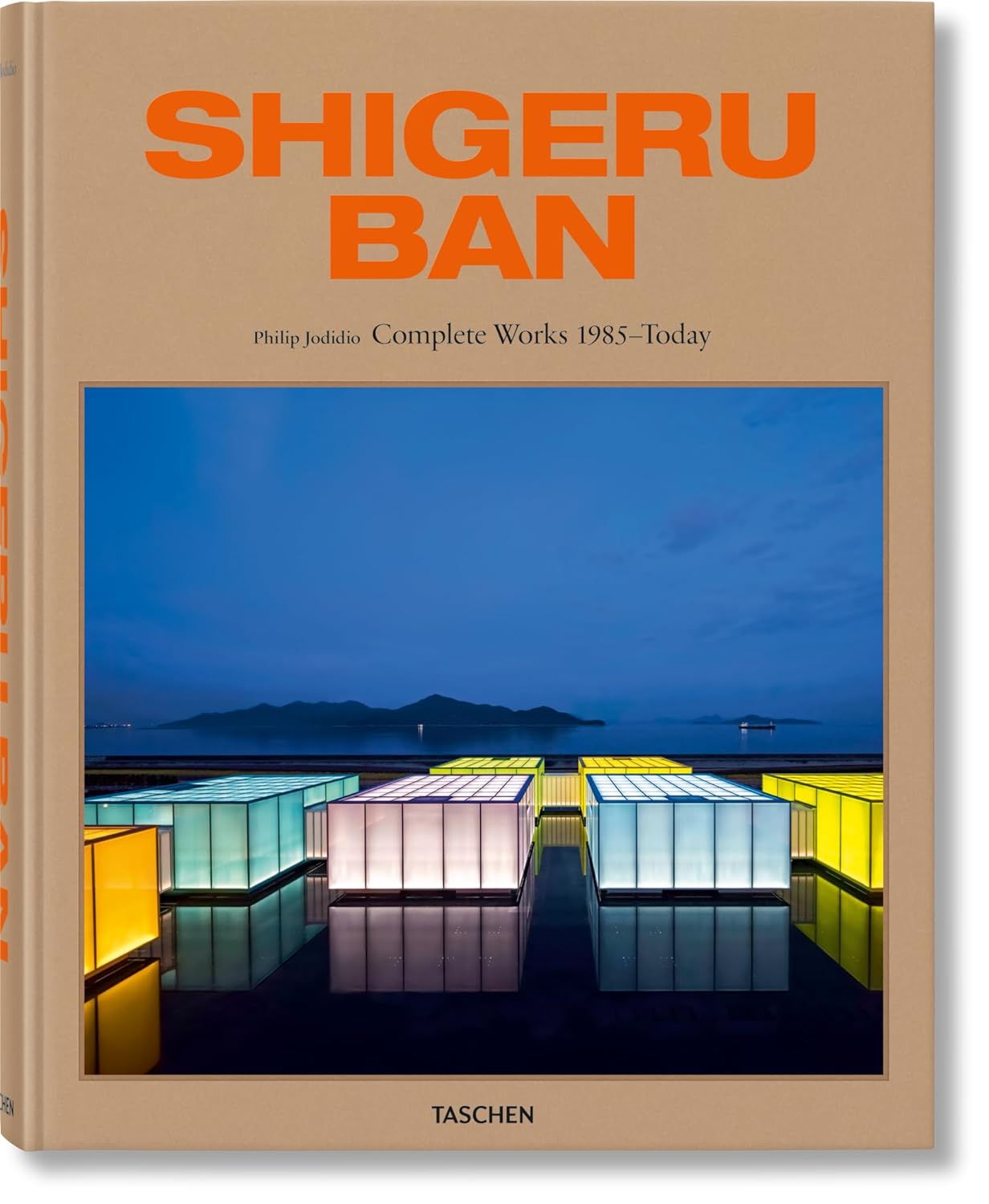SHIGERU BAN. Complete Works 1985–Today
From Paper Tube Emergency Shelters and his Nomadic Museum built with containers to the Swatch/Omega Campus and the Centre Pompidou-Metz, discover the altruistic practice of the Pritzker Prize–winning architect Shigeru Ban, who is lauded for his “curiosity, commitment, endless innovation, infallible eye, and acute sensibility.”
Also available as an Art Edition (No. 1–200), with a signed print of a sketch by Shigeru Ban and a wooden custom-built 3D laser-cut cover.
STRONG STRUCTURES
Beauty meets basic human needs—the architecture of Shigeru Ban
A valuable insight into the works and mind of Japanese architect Shigeru Ban. Author Philip Jodidio explores long anticipated completed buildings, new projects, and a future outlook of the studio Shigeru Ban after TASCHEN has followed his career from the beginning. This monograph is a journey through the years and evolution of an architect who made a name for himself with true architectural marvels that cannot be surpassed in innovation, elegance, and sensibility. Next to early buildings deploying paper tubes as structural elements, as well as houses that challenge as fundamental an idea as walls, like the Curtain Wall House in Tokyo and the Wall-Less House in Nagano’s countryside, we see plenty of recent versatile projects. View a two-story penthouse on top of a 140-year-old New York City landmark cast-iron house, the Swatch/Omega Campus in Switzerland, and the Seine Musicale, a concert hall inserted into an overall master plan conceived by Jean Nouvel for the island Île Seguin in France.
Ban’s work is characterized by a quest to understand buildings and a commitment to save and use otherwise discarded materials, which led him to inventive solutions and to claim the material paper as the staple for several of his projects. Along with this ambition, Ban gave a face to Japanese architecture while staying in touch with his unique architectural handwriting, allowing him to create a magnitude of projects worldwide. The Pritzker Prize-winning architect’s notoriety hasn’t kept him from devoting his talent and innovative ideas to those needing help. He has built shelters for refugees in Rwanda and Sri Lanka, and utilized his paper tube structures to quickly erect emergency accommodations in Fukushima and Ukraine in times of crisis. With his problem-solving, generous, and elegant approach, Shigeru Ban coins humanitarian architecture and keeps pushing the boundaries of his trade.
Also available as an Art Edition (No. 1–200) with a signed print of a sketch by Shigeru Ban and a wooden custom-built 3D laser-cut cover.
– Shigeru Ban (born in 1957) attended the SCI-Arc in California and the Cooper Union School of Architecture in New York. A member of the Voluntary Architects Network and winner of the Pritzker Prize in 2014, Ban’s innovative use of recycled materials has supported humanitarian efforts around the world. He is based in his native Tokyo, Paris, and New York.
Philip Jodidio studied art history and economics at Harvard and edited Connaissance des Arts for over 20 years. His TASCHEN books include the Architecture Now! series and monographs on numerous major architects, including Norman Foster, Tadao Ando, Renzo Piano, Jean Nouvel, and Zaha Hadid.
Potrebbero interessarti anche:
Prodotti correlati
-
In Offerta

2G 91: Adamo Faiden
59,00 €Il prezzo originale era: 59,00 €.54,00 €Il prezzo attuale è: 54,00 €. Aggiungi al carrello -
In Offerta

2G 90: Johansen Skovstedt
59,00 €Il prezzo originale era: 59,00 €.54,00 €Il prezzo attuale è: 54,00 €. Aggiungi al carrello -

PITSOU KEDEM ARCHITECTS
120,00 € Aggiungi al carrello -
In Offerta

PETER ZUMTHOR – THERME VALS
110,00 €Il prezzo originale era: 110,00 €.99,00 €Il prezzo attuale è: 99,00 €. Aggiungi al carrello
SHIGERU BAN. Complete Works 1985–Today
From Paper Tube Emergency Shelters and his Nomadic Museum built with containers to the Swatch/Omega Campus and the Centre Pompidou-Metz, discover the altruistic practice of the Pritzker Prize–winning architect Shigeru Ban, who is lauded for his “curiosity, commitment, endless innovation, infallible eye, and acute sensibility.”
Also available as an Art Edition (No. 1–200), with a signed print of a sketch by Shigeru Ban and a wooden custom-built 3D laser-cut cover.
STRONG STRUCTURES
Beauty meets basic human needs—the architecture of Shigeru Ban
A valuable insight into the works and mind of Japanese architect Shigeru Ban. Author Philip Jodidio explores long anticipated completed buildings, new projects, and a future outlook of the studio Shigeru Ban after TASCHEN has followed his career from the beginning. This monograph is a journey through the years and evolution of an architect who made a name for himself with true architectural marvels that cannot be surpassed in innovation, elegance, and sensibility. Next to early buildings deploying paper tubes as structural elements, as well as houses that challenge as fundamental an idea as walls, like the Curtain Wall House in Tokyo and the Wall-Less House in Nagano’s countryside, we see plenty of recent versatile projects. View a two-story penthouse on top of a 140-year-old New York City landmark cast-iron house, the Swatch/Omega Campus in Switzerland, and the Seine Musicale, a concert hall inserted into an overall master plan conceived by Jean Nouvel for the island Île Seguin in France.
Ban’s work is characterized by a quest to understand buildings and a commitment to save and use otherwise discarded materials, which led him to inventive solutions and to claim the material paper as the staple for several of his projects. Along with this ambition, Ban gave a face to Japanese architecture while staying in touch with his unique architectural handwriting, allowing him to create a magnitude of projects worldwide. The Pritzker Prize-winning architect’s notoriety hasn’t kept him from devoting his talent and innovative ideas to those needing help. He has built shelters for refugees in Rwanda and Sri Lanka, and utilized his paper tube structures to quickly erect emergency accommodations in Fukushima and Ukraine in times of crisis. With his problem-solving, generous, and elegant approach, Shigeru Ban coins humanitarian architecture and keeps pushing the boundaries of his trade.
Also available as an Art Edition (No. 1–200) with a signed print of a sketch by Shigeru Ban and a wooden custom-built 3D laser-cut cover.
– Shigeru Ban (born in 1957) attended the SCI-Arc in California and the Cooper Union School of Architecture in New York. A member of the Voluntary Architects Network and winner of the Pritzker Prize in 2014, Ban’s innovative use of recycled materials has supported humanitarian efforts around the world. He is based in his native Tokyo, Paris, and New York.
Philip Jodidio studied art history and economics at Harvard and edited Connaissance des Arts for over 20 years. His TASCHEN books include the Architecture Now! series and monographs on numerous major architects, including Norman Foster, Tadao Ando, Renzo Piano, Jean Nouvel, and Zaha Hadid.
Potrebbero interessarti anche:
Prodotti correlati
-

IN FOCUS
145,00 € Aggiungi al carrello -
In Offerta

I. M. PEI: Life Is Architecture
94,00 €Il prezzo originale era: 94,00 €.85,00 €Il prezzo attuale è: 85,00 €. Aggiungi al carrello -
In Offerta

2G 91: Adamo Faiden
59,00 €Il prezzo originale era: 59,00 €.54,00 €Il prezzo attuale è: 54,00 €. Aggiungi al carrello -

FOURNIER-MACCAGNAN
47,50 € Aggiungi al carrello
FAQ
Leggi le domande frequenti per avere maggiori informazioni sui metodi di pagamento, la spedizione e molto altro
Per acquistare uno o più libri è sufficiente compilare l’apposito modulo al quale si accede dalla scheda di ciascun libro.
Qualora i volumi ordinati non siano tutti immediatamente disponibili, il nostro staff si riserva di contattarti via mail per concordare le modalità di spedizione (A: invio immediato dei volumi presenti a magazzino e successivo invio di quelli mancanti – B. invio unico dopo il ricevimento da parte nostra dei volumi mancanti).
N.B. la fattura deve essere esplicitamente richiesta al momento dell’ordine, comunicando la ragione sociale completa di partita IVA e/o Codice Fiscale e Codice SDI.
Ai sensi dell’Art.5 del relativo Decreto, l’acquirente ha il diritto di recedere dal contratto e restituire i volumi ordinati entro 10 giorni lavorativi, purchè nel medesimo stato in cui li ha ricevuti. Il diritto di recesso dovrà essere esercitato mediante invio di lettera raccomandata A.R. a: LIMOND S.a.s. – via Arnolfo di Cambio 24/A – 37138 Verona (VR) – entro il termine di 10 (dieci) giorni lavorativi dal ricevimento dei volumi.
Tutti i resi dovranno essere autorizzati da Limond S.a.s (tel. +393472455641) con l’assegnazione di un numero di autorizzazione alla resa. Le spese di spedizione saranno interamente a carico del cliente e non si accetteranno pacchi in contrassegno.
Al ricevimento dei volumi, e verificata la loro integrità, Limond S.a.s. provvederà, entro 10 (dieci) giorni, ad accreditare il cliente del valore dei volumi restituiti.
La tempestività nell’evasione dell’ordine è determinata dalla disponibilità della merce ordinata. In caso di immediata disponibilità l’ordine verrà evaso entro 2 giorni lavorativi. Qualora uno o più libri non dovessero essere presenti a magazzino possono essere ordinati su richiesta; il nostro staff informerà il cliente, via mail, circa i tempi necessari per l’evasione dell’ordine.
Pagamento tramite bonifico bancario anticipato alle coordinate comunicate in fase di check-out
I costi di invio (che comprendono imballo e spedizione) per libri e riviste in ITALIA sono i seguenti:
Servizio postale: 3-5 gg (per merce immediatamente disponibile presso il nostro magazzino)
- Spedizioni per acquisti fino a 62,00€: €5,50
- Spedizioni per acquisti fino a 120,00€: €9,50
- Spedizioni per acquisti superiori a 120,00€: Gratuite
Per una quotazione dei costi di invio in EUROPA o per spedizioni internazionali vengono richiesti i seguenti dati:
- Nome/Cognome
- Indirizzo (comprensivo di Codice postale)
- Telefono (meglio se Cellulare)
Alla conferma di accettazione, verranno comunicate coordinate bancarie/account PayPal da utilizzare per il pagamento. Un Una volta ricevuto, verrà evasa la spedizione inoltrando notifica e tracciabiltà.

